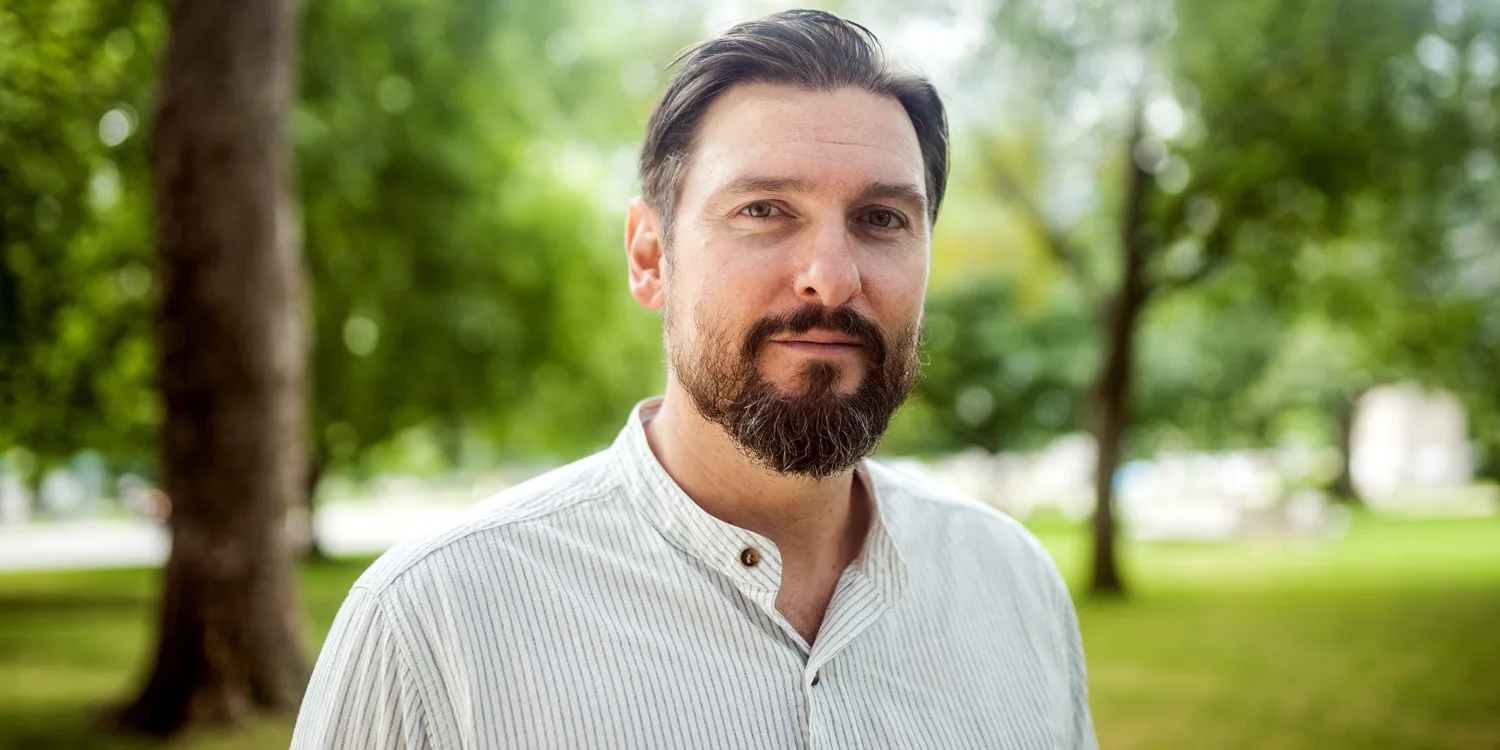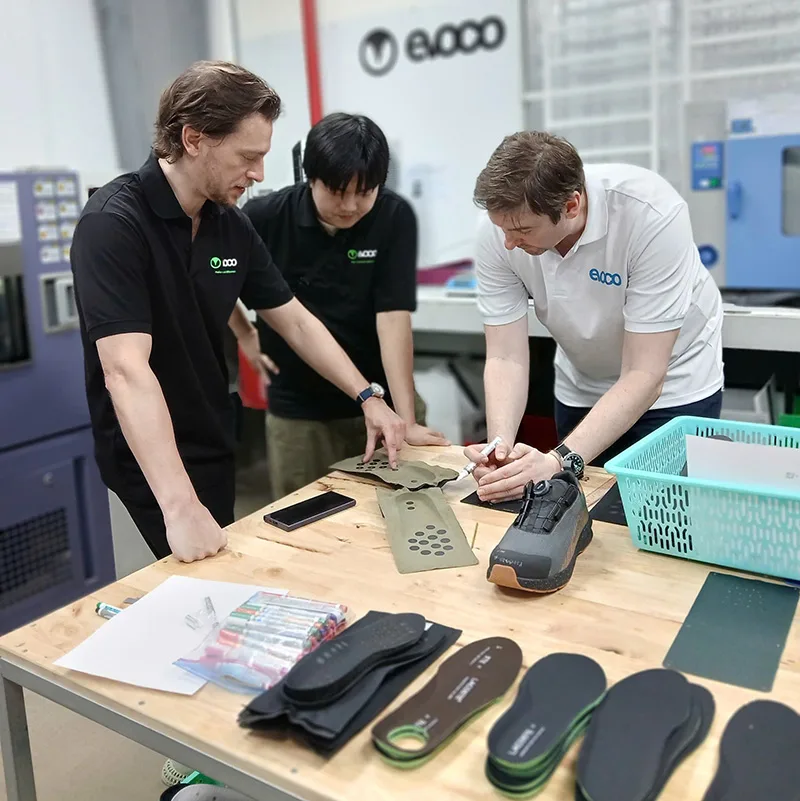Made in Canada: How Toronto-based Evoco is building a global footprint
By Dominique Ritter | July 21, 2025

CEO Jason Robinson is working to dial down the forever chemicals and carbon emissions in footwear, furniture foam and other products. And to ensure the company’s sustainable solution has maximum impact, he’s expanding into new markets.
In this series, we explore how Canadian businesses are contending with global trade disruption.
Jason Robinson is wearing old sneakers. The co-founder and CEO of Evoco, a Toronto cleantech startup that develops sustainable materials, knows that one of the best ways to reduce your carbon footprint is to avoid buying new things. But he also knows that buying new things becomes a necessity as components wear out, which is why his shoes have a new insert: Evoco’s FATES insoles, which are made from up to 85 percent renewable plant-based content and are designed to biodegrade at the end of their lifecycle.
Robinson started the company with his partner, Natalie Ashdown, in 2017 to tackle several massive problems: rising carbon emissions, excessive waste, eroding product quality and the proliferation of forever chemicals. Their first circular-design product line, made from plant byproducts, focused on the footwear industry, which pumps out 24 billion new pairs every year. Today, Evoco’s products can be found in brand names such as Vans, Bass Pro and Michael Kors, and the company is now rolling out bio-foams, bio-leathers and bio-polyurethanes to decarbonize even more industries, including furniture, fashion and car upholstery. “Plant-based materials can meet technical demands and help extend the life of everyday products,” says Robinson. “It’s a key part of reducing individual carbon footprints.”
With clients around the world and manufacturing facilities in Canada and Vietnam, Evoco’s global business is adapting to the shifting trade landscape. We spoke to Robinson about tariff turbulence, diversifying into new markets and the ROI on chasing good vibes.
Tell me about the different materials you’ve created.
We like to work with discarded or wasted non–food grade products. Some of our technologies are in foam components for footwear. We can make these products today with a variety of different plants, based on IP we’ve made for plant-based chemistry. We also have a plant-based leather alternative, which is based on a new technology we’ve developed. Foundationally, our company is set on making chemistry from plants to replace or reduce petrochemistry.
What kind of environmental impact have you achieved with your plant-based materials?
Every time we replace a traditional oil-based polyurethane foam, we generally save about 70 percent of carbon while also avoiding the use of toxic additives commonly found in fossil-derived materials. When forever chemicals are discarded in landfills, they leach out into the environment. We avoid those chemicals at all costs.
We want to create impact so that there’s more consumers buying these products and understanding that they’re buying something that’s better for the planet without it hitting their wallets.
What kind of ethos has Evoco embraced to weather these times of tariff uncertainty and geopolitical tensions?
Remain diverse and thick-skinned. Being in cleantech, it’s never been an easy road. We find opportunity in any type of economic climate — whether it’s geopolitically driven or economically driven. That’s how we’ve weathered a multitude of storms over the last 10 years — including COVID and inflation — and we’re now embracing where we’re at today.
COVID was a challenging time because of the uncertainty but we were all together in that same challenge. Tariffs and global geopolitical tensions hit companies differently. We’re all dealing with our own uncertainties. With COVID, we had a backdrop of government support. We certainly want to see government support for Canadian companies that may be going through hardships because of tariffs. That support is going to be vital, for not only companies to survive, but to thrive and actually look at diversifying supply chains into other markets.
How are tariffs affecting your business — directly or indirectly?
We’re not seeing a lot of direct impact today; what we’re seeing is indirect impact. There’s a movement of supply chains because of the ongoing tariff situations with Asia and Europe.
The footwear industry is not going to be able to move in a matter of days or months. It’s going to be a year’s worth of movement in terms of diversification of the supply chain. Evoco is well set up for that. We have manufacturing and partnerships in Europe and across Asia, and we’re looking to continue that expansion globally.
Could you give me an example of how one of those scenarios is playing out?
We had a project based in the U.S. for an automotive company. That project has now shifted into another part of the world because there is more domestic sourcing of materials. We were able to accommodate the client through our operations in Vietnam.
We’ve seen a project cancelled because of uncertainty. But we’ve also been a beneficiary of shifting supply chains because we are quite diverse in our ability to move materials and make products across Asia for different supply chains and different customers.

By using plant byproducts in its sustainable insoles, Evoco is able to reduce carbon emissions by up to 70 percent compared to ones made with traditional oil-based polyurethane foams.
How are you diversifying your own supply chain?
We are aggressively pursuing more operations within Europe and more European customers. We’re also seeing aggressive growth across Asia, and we are moving more manufacturing over to Asia. We also are looking at how we domesticate, whether it’s in the U.S. or Canada. We’ve built our supply chain to be resilient and globally responsive. This flexibility allows us to stay closely aligned with customers as they adapt to shifting trade and sourcing dynamics.
It seems like there’s a lot of openness and good will in Europe and Asia. Is that what you’re finding?
As a business, we’re always trying to move toward the good vibes and to overcome the challenging ones. We’re seeing a lot of opportunities in Europe, Australia, Southeast Asia, and we can look toward other global economies such as India. We still have many friends, colleagues and partnerships in the U.S., and we can still find a lot of opportunities there. There’s a level of empathy for Canadian companies and there are certain hardships that the U.S. companies are going through as well. I feel like there’s no animosity, but more “Let’s find ways to continue to build and find opportunities.”
What’s your perspective on the challenges facing Canadian startups, specifically in scaling manufacturing?
Because hard tech usually requires a lot of capital to build, there tends to be a higher risk in the initial phases of raising money. There’s less venture capital in Canada than, say, in the U.S. As Canadians, I think we have to look at diversifying our investors’ portfolio and looking to other regions to raise larger pools of money.
Government initiatives are very important. We have a lot of good R&D initiatives, R&D tax credits, R&D funding, but we’re missing that funding between R&D and scaling. We don’t want to always just sell our R&D to other parts of the world. We want to be able to develop it here and continue to scale it here, and then deploy it outside of Canada.
Any new developments or milestones that you’ve hit recently?
Last year was really about starting up our Vietnam factory. It’s fully operational and is now showing significant revenue growth. We will be raising a significant equity round this year to continue to build out domestic and global operations and, more importantly, to extend our product portfolio and reach new industries.
What’s next for Evoco?
We plan to extend the IP that’s driving the foam technology into other products like plant-based leather alternatives, different types of plant-based plastics that are high-performance. We have 17 patents granted today. We have a lot of projects in the pipeline. You’ll see the Evoco name in things like furniture, automotive and other consumer goods.
I’ve always thought that you can find ways to do well and make money by doing good. That’s the premise at Evoco. To address the challenges head-on, you don’t need to change who you are. You can find novel ways to keep engaging in the business environment and still be sustainably minded.
Find out how MaRS supports technology ventures, investors and other organizations to accelerate the adoption of high-impact solutions to some of the world’s most pressing issues.
Photos courtesy of Evoco
 Dominique Ritter
Dominique Ritter